Peugeot 308 vs Skoda Scala - Differences and prices compared
Costs and Efficiency:
When it comes to price and running costs, the biggest differences usually appear. This is often where you see which car fits your budget better in the long run.
Skoda Scala has a evident advantage in terms of price – it starts at 20900 £, while the Peugeot 308 costs 29200 £. That’s a price difference of around 8332 £.
Fuel consumption also shows a difference: Peugeot 308 manages with 2.30 L and is therefore clearly more efficient than the Skoda Scala with 5 L. The difference is about 2.70 L per 100 km.
Engine and Performance:
Power, torque and acceleration are the classic benchmarks for car enthusiasts – and here, some clear differences start to show.
When it comes to engine power, the Peugeot 308 has a distinct edge – offering 195 HP compared to 150 HP. That’s roughly 45 HP more horsepower.
In acceleration from 0 to 100 km/h, the Peugeot 308 is hardly perceptible quicker – completing the sprint in 7.60 s, while the Skoda Scala takes 8.20 s. That’s about 0.60 s faster.
In terms of top speed, the Peugeot 308 performs slight better – reaching 225 km/h, while the Skoda Scala tops out at 221 km/h. The difference is around 4 km/h.
There’s also a difference in torque: Peugeot 308 pulls a bit stronger with 300 Nm compared to 250 Nm. That’s about 50 Nm difference.
Space and Everyday Use:
Cabin size, boot volume and payload all play a role in everyday practicality. Here, comfort and flexibility make the difference.
Seats: offers more seating capacity – vs .
In curb weight, Skoda Scala is evident lighter – 1199 kg compared to 1453 kg. The difference is around 254 kg.
In terms of boot space, the Skoda Scala offers a bit more room – 467 L compared to 412 L. That’s a difference of about 55 L.
In maximum load capacity, the Skoda Scala performs barely noticeable better – up to 1410 L, which is about 87 L more than the Peugeot 308.
When it comes to payload, Peugeot 308 a bit takes the win – 503 kg compared to 431 kg. That’s a difference of about 72 kg.
Who wins the race?
The Peugeot 308 proves to be leaves the rival little chance and therefore becomes our DriveDuel Champion!
Peugeot 308 is the better all-rounder in this comparison.
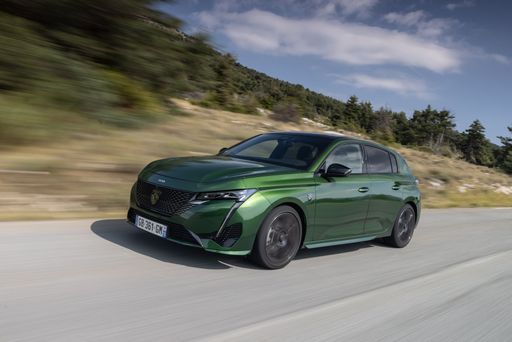 @ Peugeot / Stellantis Media
@ Peugeot / Stellantis Media
Peugeot 308
Costs and Consumption
View detailed analysis
Engine and Performance
View detailed analysis
Dimensions and Body
View detailed analysis
Peugeot 308
The Peugeot 308 brings a sleek, feline profile and an unexpectedly upscale cabin, with clever packaging and materials that feel a touch more premium than you might expect. It’s composed on the road, easy to live with for daily life, and a smart choice if you want a stylish hatch that still behaves when the road gets interesting.
details @ Peugeot / Stellantis Media
@ Peugeot / Stellantis Media
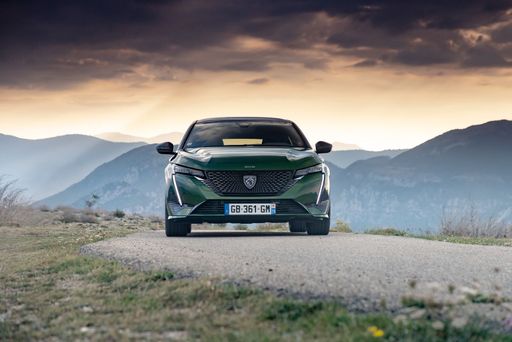 @ Peugeot / Stellantis Media
@ Peugeot / Stellantis Media
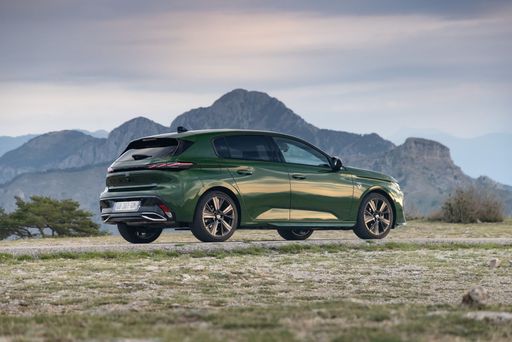 @ Peugeot / Stellantis Media
@ Peugeot / Stellantis Media
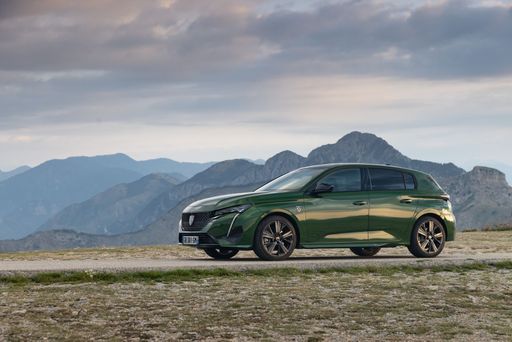 @ Peugeot / Stellantis Media
@ Peugeot / Stellantis Media
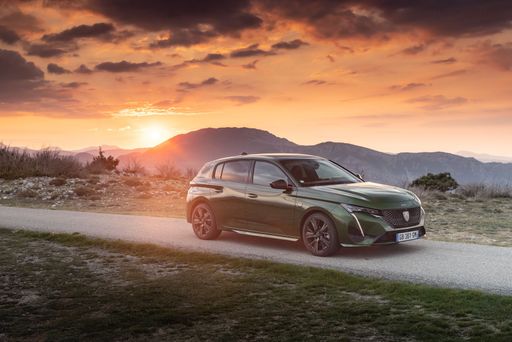 @ Peugeot / Stellantis Media
@ Peugeot / Stellantis Media
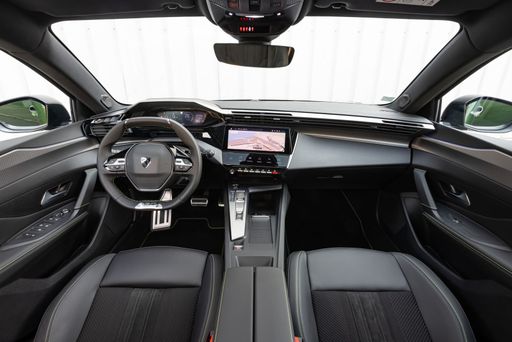 @ Peugeot / Stellantis Media
@ Peugeot / Stellantis Media
Skoda Scala
The Skoda Scala is a tidy, no-nonsense hatch that wraps clever packaging and composed manners into a compact, grown-up package. It’s the sensible choice for buyers who want everyday practicality with a dash of style and personality—no drama, just reliable charm.
details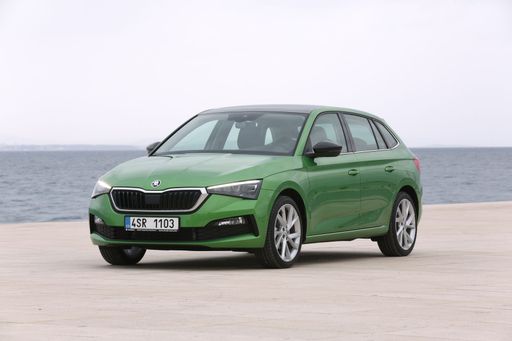 @ Škoda Auto a.s. / Škoda Storyboard
@ Škoda Auto a.s. / Škoda Storyboard
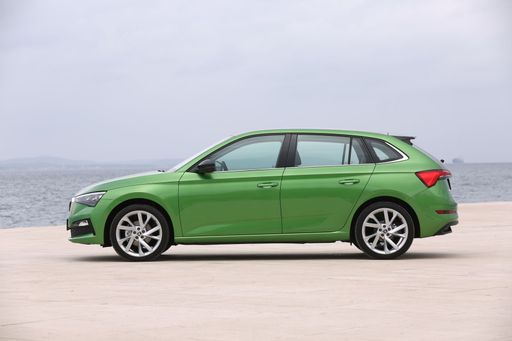 @ Škoda Auto a.s. / Škoda Storyboard
@ Škoda Auto a.s. / Škoda Storyboard
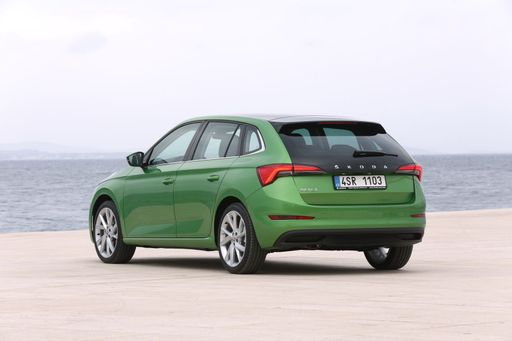 @ Škoda Auto a.s. / Škoda Storyboard
@ Škoda Auto a.s. / Škoda Storyboard
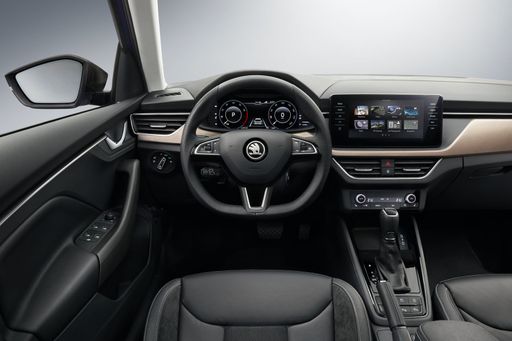 @ Škoda Auto a.s. / Škoda Storyboard
@ Škoda Auto a.s. / Škoda Storyboard
 @ Peugeot / Stellantis Media
@ Peugeot / Stellantis Media
|
 @ Škoda Auto a.s. / Škoda Storyboard
@ Škoda Auto a.s. / Škoda Storyboard
|
|
|
|
Costs and Consumption |
|
|---|---|
|
Price
29200 - 42600 £
|
Price
20900 - 30700 £
|
|
Consumption L/100km
2.3 - 5 L
|
Consumption L/100km
5 - 5.6 L
|
|
Consumption kWh/100km
15.60 kWh
|
Consumption kWh/100km
-
|
|
Electric Range
78 - 450 km
|
Electric Range
-
|
|
Battery Capacity
0.40 kWh
|
Battery Capacity
-
|
|
co2
0 - 129 g/km
|
co2
114 - 126 g/km
|
|
Fuel tank capacity
42 - 52 L
|
Fuel tank capacity
50 L
|
Dimensions and Body |
|
|---|---|
|
Body Type
Hatchback
|
Body Type
Hatchback
|
|
Seats
5
|
Seats
5
|
|
Doors
5
|
Doors
5
|
|
Curb weight
1453 - 1749 kg
|
Curb weight
1199 - 1271 kg
|
|
Trunk capacity
314 - 412 L
|
Trunk capacity
467 L
|
|
Length
4367 mm
|
Length
4362 mm
|
|
Width
1852 mm
|
Width
1793 mm
|
|
Height
1438 mm
|
Height
1514 mm
|
|
Max trunk capacity
1258 - 1323 L
|
Max trunk capacity
1410 L
|
|
Payload
430 - 503 kg
|
Payload
403 - 431 kg
|
Engine and Performance |
|
|---|---|
|
Engine Type
Petrol MHEV, Diesel, Plugin Hybrid, Electric
|
Engine Type
Petrol
|
|
Transmission
Automatic
|
Transmission
Manuel, Automatic
|
|
Transmission Detail
Dual-Clutch Automatic, Automatic Gearbox, Reduction Gearbox
|
Transmission Detail
Manual Gearbox, Dual-Clutch Automatic
|
|
Drive Type
Front-Wheel Drive
|
Drive Type
Front-Wheel Drive
|
|
Power HP
131 - 195 HP
|
Power HP
95 - 150 HP
|
|
Acceleration 0-100km/h
7.6 - 10.6 s
|
Acceleration 0-100km/h
8.2 - 10.8 s
|
|
Max Speed
170 - 225 km/h
|
Max Speed
192 - 221 km/h
|
|
Torque
230 - 300 Nm
|
Torque
175 - 250 Nm
|
|
Number of Cylinders
3 - 4
|
Number of Cylinders
3 - 4
|
|
Power kW
96 - 144 kW
|
Power kW
70 - 110 kW
|
|
Engine capacity
1199 - 1598 cm3
|
Engine capacity
999 - 1498 cm3
|
General |
|
|---|---|
|
Model Year
2025
|
Model Year
2025
|
|
CO2 Efficiency Class
C, D, B, A
|
CO2 Efficiency Class
C, D
|
|
Brand
Peugeot
|
Brand
Skoda
|
Is the Peugeot 308 offered with different drivetrains?
Available configurations include Front-Wheel Drive.
The prices and data displayed are estimates based on German list prices and may vary by country. This information is not legally binding.
